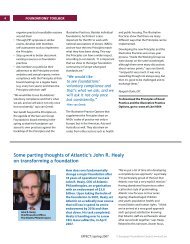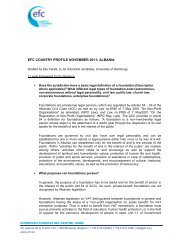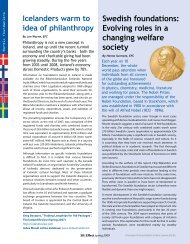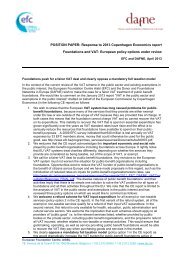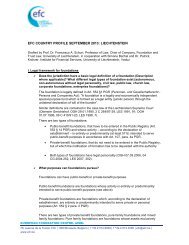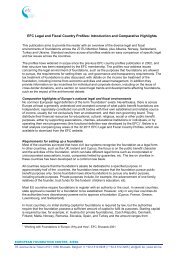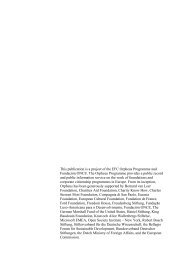European perspectives on global health: a policy glossary
European perspectives on global health: a policy glossary
European perspectives on global health: a policy glossary
Create successful ePaper yourself
Turn your PDF publications into a flip-book with our unique Google optimized e-Paper software.
3. Europe must assert its role in <strong>global</strong> <strong>health</strong> governance<br />
civil society organisati<strong>on</strong>s and private foundati<strong>on</strong>s in<br />
<strong>health</strong> and the rise of new organisati<strong>on</strong>al forms like<br />
GPPPs in fields where private actors do not supply<br />
important goods which public actors as well are not<br />
in a positi<strong>on</strong> to produce ( such as medicines in the<br />
field of neglected diseases ). In general, the retreat of<br />
the state from delivering public goods and services<br />
in combinati<strong>on</strong> with the percepti<strong>on</strong> of growing<br />
threats has favoured problem-oriented approaches, in<br />
particular strategies to focus <strong>on</strong> specific diseases.<br />
The politics of fighting HIV / AIDS and other infectious<br />
diseases is a good example of this development.<br />
The recogniti<strong>on</strong> of the growing threat from these<br />
diseases has led to a significant increase in financial<br />
and knowledge resources. The creati<strong>on</strong> of the Global<br />
Fund to Fight AIDS, Tuberculosis and Malaria as a<br />
separate organisati<strong>on</strong> outside the UN system and the<br />
increasing importance of private foundati<strong>on</strong>s in GPPPs<br />
to the strengthening of R&D activities as well as the<br />
access to available medicines in the field of neglected<br />
diseases c<strong>on</strong>stitute important examples of these<br />
tendencies. Private actors ( in particular civil society<br />
organisati<strong>on</strong>s ) can also be found at the forefr<strong>on</strong>t of<br />
c<strong>on</strong>flicts with pharmaceutical companies and TRIPS <strong>on</strong><br />
problems of access to medicines due to the expansi<strong>on</strong><br />
of patent right systems into developing countries.<br />
Nevertheless, increasingly the lack of transparency,<br />
lack of accountability and the problems of<br />
coordinati<strong>on</strong> due to the proliferati<strong>on</strong> of actors in this<br />
field have been recognised and the deficiencies of<br />
nati<strong>on</strong>al <strong>health</strong> systems, above all in poor countries, is<br />
again recognised as a major problem. These problems<br />
are also recognised in the more general field of<br />
development cooperati<strong>on</strong> and this c<strong>on</strong>text have led<br />
to important agreements like the Rome Declarati<strong>on</strong><br />
<strong>on</strong> Harm<strong>on</strong>isati<strong>on</strong> and the Paris Declarati<strong>on</strong> <strong>on</strong> Aid<br />
Effectiveness, which c<strong>on</strong>tain insights and strategies<br />
that are also important for <strong>global</strong> <strong>health</strong>.<br />
On the other hand, <strong>global</strong>isati<strong>on</strong> also has increased<br />
the need for binding internati<strong>on</strong>al agreements,<br />
which has been an element of strengthening WHO<br />
as an internati<strong>on</strong>al governmental organisati<strong>on</strong>.<br />
The new Internati<strong>on</strong>al Health Regulati<strong>on</strong>s and the<br />
Framework C<strong>on</strong>venti<strong>on</strong> <strong>on</strong> Tobacco C<strong>on</strong>trol can be<br />
seen as important indicati<strong>on</strong>s of this. In additi<strong>on</strong>, the<br />
WHO is asserting its positi<strong>on</strong> as the central authority<br />
in <strong>global</strong> <strong>health</strong> by initiatives to improve <strong>global</strong><br />
understanding <strong>on</strong> some central issues cutting across<br />
narrow instituti<strong>on</strong>al borders and academic disciplines,<br />
for example : the Commissi<strong>on</strong> <strong>on</strong> Macroec<strong>on</strong>omics<br />
and Health, the Commissi<strong>on</strong> <strong>on</strong> Intellectual Property<br />
Rights and Innovati<strong>on</strong> in Health and the Commissi<strong>on</strong><br />
<strong>on</strong> Social Determinants of Health.<br />
In the recent past, the <str<strong>on</strong>g>European</str<strong>on</strong>g> Uni<strong>on</strong> and <str<strong>on</strong>g>European</str<strong>on</strong>g><br />
countries have played an ambiguous role in the<br />
politics of <strong>global</strong> <strong>health</strong>. On the <strong>on</strong>e hand, they have<br />
defended rather narrow ec<strong>on</strong>omic interests mostly<br />
in the c<strong>on</strong>text of WTO and TRIPS and in relati<strong>on</strong> to<br />
the migrati<strong>on</strong> of <strong>health</strong> workers from the South into<br />
Europe. On the other hand they have c<strong>on</strong>tributed<br />
to the increase in resources for internati<strong>on</strong>al <strong>health</strong><br />
activities by giving support for <strong>health</strong> system<br />
development in poor countries and bridging the digital<br />
divide between Europe and the South and by putting<br />
in general a str<strong>on</strong>ger focus <strong>on</strong> humanitarian aid and<br />
support for the provisi<strong>on</strong> of <strong>global</strong> public goods such<br />
as <strong>health</strong> and envir<strong>on</strong>mental protecti<strong>on</strong>.<br />
Acti<strong>on</strong> : The role of Europe in <strong>global</strong> <strong>health</strong> politics<br />
should be reinforced by better coordinati<strong>on</strong> within<br />
Europe itself, for example by initiating a <str<strong>on</strong>g>European</str<strong>on</strong>g><br />
<strong>global</strong> <strong>health</strong> strategy process to clarify Europe’s<br />
values, strategic priorities, and preferred governance<br />
approaches.<br />
References :<br />
Lee, Kelley. Health Policy in a Globalising World.<br />
Cambridge : Cambridge University Press, 2006.<br />
( Includes chapters by Kent Buse )<br />
48 <str<strong>on</strong>g>European</str<strong>on</strong>g> Foundati<strong>on</strong> Centre – <str<strong>on</strong>g>European</str<strong>on</strong>g> Partnership for Global Health



